Spider-Man Far From Home Review
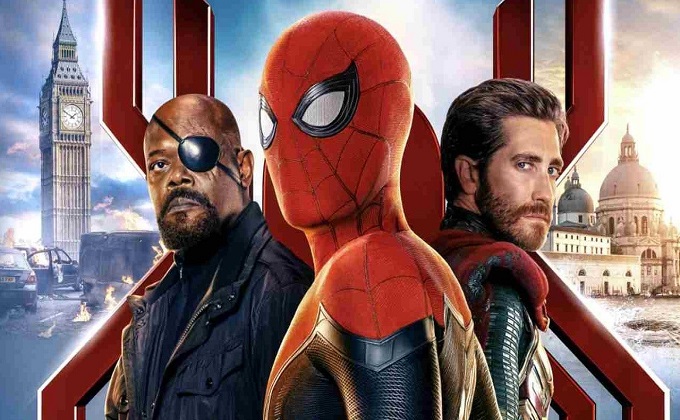
The Plot
Peter Parker returns to his normal life following the climactic events of Avengers Endgame and sets out on a summer holiday to Europe with his friends looking to escape the pressures of being Spider-Man and possibly even find love.
The Good
Marvel takes an assured first step as it casually launches the next phase in its vast cinematic universe. After the dramatic and universe re-defining adventures of Avengers Endgame, it’s refreshing and vaguely appropriate to have the adolescent Peter Parker guide audiences back to more earthbound human drama in a post ‘snap’ world.
Swinging back into action as Spider-Man, young star Tom Holland continues to do great work in making his version of the costume clad web crawler an endearingly awkward and earnest young hero, reluctantly drawn into the responsibilities of saving the world yet again. Holland does well in playing the genuine conflict between Peter Parker’s desire for an ordinary teenage existence and the obvious responsibilities of being a super hero. This is the true essence of the character that Stan Lee originally created and Marvel clearly understands that.
Having obviously lost the excellent chemistry between Holland and Robert Downey Jnr’s mentor like Iron Man, Marvel is quick to replace this with a new adult chaperone for Spider-Man in the form of a stern faced Nick Fury, played with usual flare by Samuel L Jackson. It’s a smart move that gives both characters a more natural place in the MCU going forward. Combined with the more affectionate mentorship of Jon Favreu’s Happy Hogan it’s a successful substitution for the scene stealing bond between Peter and Tony Stark.
A solid supporting cast lends Far From Home much of its comedy and heart with particular praise due to Jacob Batalon as Peters pal Ned, Martin Starr as his clueless teacher and Zendaya as love interest MJ. Jake Gyllenhaal is also another welcome and long overdue addition to the MCU, playing the suitably mysterious new hero Mysterio.
The Bad
Some of the film’s plot points might be a little too easily second guessed by those familiar with the comics. Also given the sheer number of films Marvel have already offered up to fans it’s a little difficult to find a story that offers something truly original and unexpected at this stage.
The film is also burdened with having to explain how a post Thanos world functions, forcing the film to hastily gloss over the many unanswered questions about the ‘snap’ and its eventual undoing. This new world presents plenty of unique storytelling opportunities that could have been explored by much more than just a couple of minutes of casual exposition nestled amongst an otherwise unrelated adventure.
While the film offers plenty of the usual action it’s perhaps also noticeably slightly more cartoonish and obviously CGI enhanced than past Spider-Man versions have been. Likewise the film’s set pieces and European setting does at times fell like an obvious parade of recognisable landmarks. As a vehicle for moving the story forward a literal tourist road trip feels just a little heavy handed at times. Though certain to be a huge help with international marketing campaigns.
The Ugly Truth
Spider-Man Far From Home is another pleasingly playful addition to the never ending MCU that gives Tom Holland another chance to shine as a convincingly adolescent Pete Parker and an increasingly seasoned Spider-Man. The film follows a similar formula as Spider-Man Homecoming and offers fans the usual mix of action, winking comedy and even a few genuine surprises along the way.
Review by Russell Nelson
Extremely Wicked Shockingly Evil and Vile Review
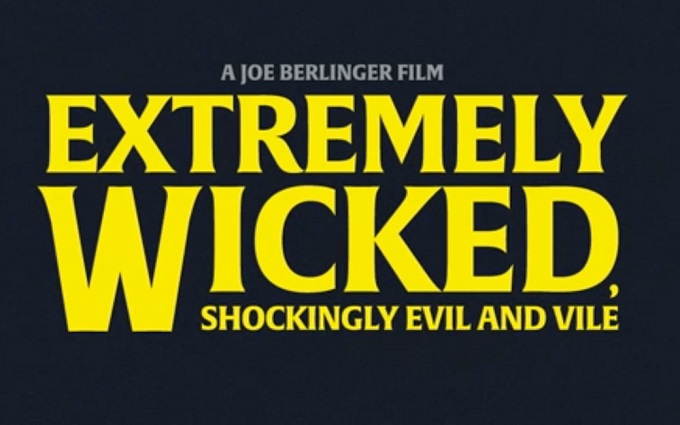
The Plot
Handsome and charismatic young law student Ted Bundy becomes the centre of a sensational series of murder trials during the 1970s that suggest he may in fact be a prolific and dangerously violent serial killer, leaving his girlfriend and family struggling to know what to believe.
The Good
Zac Efron has gradually graduated from High School Musical teen stardom to achieve a firmly cemented status as a credible leading man. The impeccably handsome and charismatic star is a surprisingly good fit for Ted Bundy. A million miles away from the silly comedy antics of Bad Neighbours, Dirty Grandpa or Baywatch; in this drama Efron offer audiences a performance that is compelling and subtle. It makes it easy to root for Bundy in the way so many people actually did during his exceedingly public legal battles. It also displays a genuine acting talent that goes well beyond Efron being merely blessed with movie star good looks and a perfectly chiselled physique.
Alongside Efron actress Lily Collins portrays Bundy’s supportive girlfriend. Following their relationship from domestic bliss through a series of increasingly difficult and shocking court cases. Collins does well at portraying the complex mix of emotions faced by a young woman confronted by the possibility that her seemingly perfect partner and surrogate father to her young daughter may perhaps be secretly monstrous. Paired well with Efron she lends the story a fresh perspective to all the previous documentary explorations of the Bundy cases.
Overall the film is well produced with a visual style and authentic attention to detail that does justice to the film’s source material and perfectly captures the spirit of the 1970s and the famous hysteria surrounding the case. Director Joe Berlinger has previously directed the Netflix Ted Bundy documentary series and clearly has a highly detailed knowledge of Bundy’s life. Having already explored the subject at length he was clearly the perfect filmmaker to produce this expertly dramatized account.
The film’s choice to refrain from depicting any of the horrific crimes which Bundy was accused of allows the focus to remain firmly on the extraordinary dynamic between Bundy and those closest to him in his normal life. In a way obviously this refusal to make entertainment out of such violent acts allows he film to avoid allegations that it is merely sensationalising or glamourizing acts of brutality. It keeps the film focused more interestingly on the emotional aspects of the stunning events surrounding Bundy’s long running legal battle.
The Bad
Those familiar with the real life drama and ultimate outcome of the Ted Bundy trials will undoubtedly find the film robbed of an element of suspense. The film’s carefully crafted efforts to keep Bundy’s guilt or innocence as a source of apparent ambiguity will obviously prove less effective to those already familiar with the case.
Likewise audiences hoping to see dramatic depictions of some of the horrific crimes Bundy was accused of will perhaps feel cheated by the film’s deliberate choice to avoid showing any of this ugly violence. While that is a deliberate choice it obviously won’t be welcomed by true crime and horror fans hoping for the adrenalin rush of seeing the actions of an alleged mass murdering monster first hand.
The Ugly Truth
Compelling central performances particularly form leads Zac Efron and lily Collins, combined with riveting real life source material makes for a truly intriguing piece of drama about one of the most notorious cases in modern legal history. The film offers a rounded portrayal of courtroom drama that will admittedly be familiar to many, leaving audiences with thoughtful insights into the true human impact of these events.
Review by Russell Nelson
Man of La Mancha Review
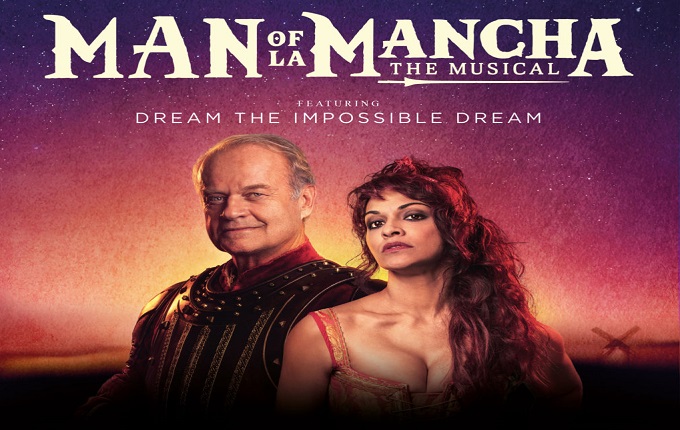
The Plot
Thrown into a brutal prison at the height of the Spanish inquisition, a man pleads his case to his fellow prisoners in a unique way, by performing the whimsical tale of peasant man who dreams of being a mythical knight called Don Quixote, seeing the world in strange and wondrous ways.
The Good
Kelsey Grammer is an unassuming Hollywood star much beloved for his decades of work on screen. His enduring success and much beloved status is thanks to the unique gravel voiced charisma he possesses. He is simultaneously able to be bombastically pompous and sincerely subtle, the result being an authentically captivating stage presence. Those talents helped make him a household name playing the truly iconic character of Dr Frasier Crane for many decades and they make him a similarly perfect fit for this role. Much like Kelsey’s iconic alter ego Frasier, Don Quixote possesses an abundantly optimistic and kind hearted spirit. It’s an inspiring and deeply admirably trait, especially in the face of life’s cruellest adversities and disappointments. People who enjoy that aspect of Grammer’s on screen person will find it a special delight to witness it first hand on stage.
While Kelsey Grammer is well known for his acting talents, audience may be curious about just how powerful his singing gifts are, especially in the face of needing to deliver a powerhouse ballad like Dream The Impossible Dream. It’s a pleasure to be able to report that Grammer’s commanding voice stretches beyond the mere talent required to sing the memorable Fraiser theme song. There is a rich warmth and powerful depth to Grammer’s singing voice which is totally equal to his familiar spoken charms.
Alongside Grammer’s charismatic Don Quixote the production find able support from the vocal talents of Danielle De Niese and the comedic gifts of much beloved comedic treasure Nicholas Lyndhurst. Special mention must also be made of Peter Polycarpou playing Grammer’s faithful manservant Sancho Panza, his unwavering support for the ever deluded don is critical in keeping audiences similarly committed to following him on his mad quest.
Beyond the many acting talents on display the production offer audiences a rare chance to see one of the greatest songs in musical theatre delivered on London’s finest stage. The Impossible Dream is a piece of music that is both instantly memorable and poignantly true. Both times the production deploys it there is a genuinely uplifting effect on an audience. It has been over 50 years since audiences even in the West End had the privilege to see it performed in its original context and doing so enhances the meaning far more than any number of karaoke renditions.
The Bad
While Don Quixote is a character synonymous with eternal optimism and whimsical self-delusion, it’s perhaps important to warn that this production sharply contrast that joyous escapism with some very harsh realities. Don Quixote may invite us all to chase adventure and do heroic battle with dragons or giants, but this is somewhat cruelly juxtaposed with genuine moments of tragedy and violence. Even if the production ultimately steers back towards hopefulness audiences may find at least one sequence of authentic violence and cruelty difficult to forget.
As a play within a play, the lines between fiction and reality are often a little blurred and the story admittedly exists on many different levels. However, at least one of those levels is a little nasty in tone at times. Obviously that is the entire point of the show that our perceptions of life are as cruel or as kind as we allow them to be. But again, for more sensitive audiences they may find it harder to enjoy the unhinged optimism of Don Quixote when it is so sharply undercut by a bleak and somewhat savage reality.
In a similar fashion while ‘The impossible dream’ is a truly perfect musical standard, obviously it’s quite difficult for the productions other less familiar songs to compare alongside this unsurpassably iconic and crowd pleasing ballad. So while that one amazing song is obviously a major asset for the production it does set impossibly high standards for the rest of the score.
The Ugly Truth
Kelsey Grammer is a beloved acting icon who is uniquely equipped to breathe life into the heroically delusional Don Quixote. Surrounded by a solid supporting cast and armed with a song as iconic as The Impossible Dream, it’s hard not to be won over by his boundless charms. Even if the production does have admittedly darker tones at times than might suit some tastes, it remains a joy to behold Kelsey’s inspiring Don Quixote soaring above those moments. With a tantalisingly short run of only 6 weeks those who want to enjoy this quest should take the chance swiftly…
Review by Russell Nelson
Avengers Endgame Review
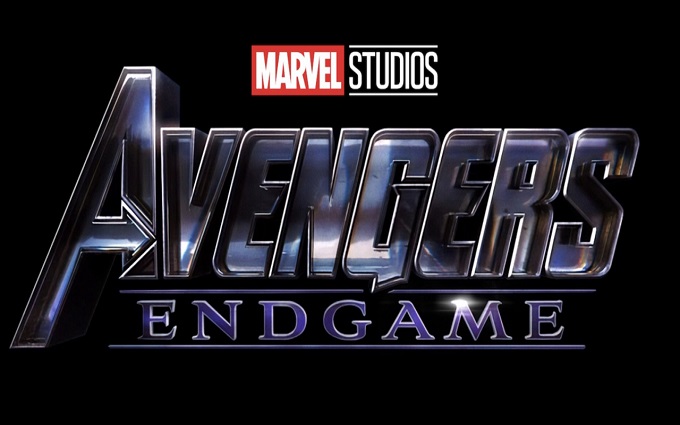
The Plot
In the aftermath of failure in their climactic battle with Infinity Gauntlet wielding Thanos, the remaining Avengers unite to search desperately for a way to bring back the half of all life in the universe that has been cruelly wiped out of existence by ‘the snap’.
The Good
It’s an unquestionable delight for fans to see Marvel’s combined cinematic universe pooled together on screen for perhaps the last time, at least on this scale. It’s important to remember just how unprecedented it was for Marvel to assemble their Avengers in the first place and it’s a testament to the strength of the universe they built that it’s possible for almost every character to seamlessly integrate into this final chapter.
As with Infinity War, Endgame gives some characters more screen time and satisfying development than others. Inevitably those characters that felt neglected and overlooked last time tend to be given the greater prominence in this chapter. In particular characters like Hawkeye, Ant-Man and Nebula are brilliant examples of how the scale of the franchise has allowed even seemingly simple supporting characters to grow with surprising depth. All three are on scene stealing form this time.
Meanwhile many of the the key figures in the MCU clearly reach the end of their journeys in ways which are by turns either bittersweet, surprising, amusing or outright heart-warming. While there is at least some tragedy along the way, it’s nothing compared to the crushing conclusion of Infinity War, that emotionally sucker punched fans in such a deeply brutal way. To that extent Endgame definitely serves a valuable purpose by giving fans some much needed catharsis and restoring considerable joy to the MCU.
Speaking of joy, while Endgame has plenty of drama and seriousness it also follows the by now well established Marvel template of marrying this with a frequent stream of one liners and tongue in cheek gags. There’s certainly many moments and lines sure to prove instant fan favourites and ready made for lingering meme status.
Above all perhaps Marvel deserve credit for managing to keep so much of Endgame so firmly under wraps, allowing fans to enjoy this huge blockbuster experience with a genuine sense of mystery and excitement. Even if social media has become an instant minefield for those that haven’t rushed out to see Endgame instantly, at least Marvel didn’t ruin the experience by drowning fans with promotional material that gives away the entire film. A mistake so many studios fall into. Marvel have trusted fans to remain loyal to the franchise and this is yet another massive 3 hour reward for that patience.
The Bad
Avengers Endgame had a near impossible task of finding a way to draw a 22 film saga to a suitably epic and satisfying conclusion. While obviously impressive in both scale and spectacle it’s a little unfortunate that unlike Infinity War and some of the standalone films, Endgame feels slightly less carefully crafted with a narrative that leaves some obvious plot holes and logical inconsistencies which may prove difficult to entirely ignore.
Ironically the most special thing about Marvels shared cinematic universe had always been just how painstakingly well integrated each story was. Marvel took the unprecedented time and effort to ensure that unlike other franchises, such as the increasingly messy DC Comics, X-Men or Star Wars sagas, the MCU had a near perfect continuity. Having succeeded for so long in preserving that easy to follow shared narrative, it’s a little sad to see Marvel perhaps fall down at the final hurdle. Endgame risks that consistency somewhat with a plot built around sci-fi clichés that leaves far too many obvious questions unanswered.
Beyond overall issues many fans might have with dubious plot points in Endgame, the most divisive issue will likely be how the film handles some of Marvel’s most popular characters. It’s genuinely shocking just how much at least a couple of key characters are unrecognisably changed for this final chapter. In fact at least one of the core Avengers cast is completely reduced to the status of being purely comic relief. While some fans may enjoy this surprising twist, others will no doubt be dismayed to see one of their favourite Marvel character turned into a walking punchline for this important final chapter.
Endgame also features some fairly heavy handed attempts by Marvel to address lingering criticisms about the alleged lack of diversity in the MCU. Perhaps the clearest example being an embarrassingly awkward instance where the film conveniently gathers all its female characters together around the MCU’s last minute poster girl Captain Marvel. It serves no real purpose other than as a token flag waving gesture.
What’s even more ironic is that having hastily introduced Captain Marvel with her own recent film, the supposed new face of the MCU is actually an almost non-existent presence in this film. Brie Larson is given mere minutes of screen time and contributes far less than some of Marvel’s most minor figures. It almost makes it baffling why Marvel rushed the introduction of the character before Endgame rather than just using her as a more natural fresh start afterwards.
The Ugly Truth
Avengers Endgame is an unprecedented event in cinematic history and its record breaking box office glory is already assured. Although undoubtedly certain specific elements are likely to fiercely divide fans, overall there’s still vast amounts for everyone to enjoy, especially for those willing to actively forget about logic and just enjoy the ride.
Review by Russell Nelson
Hellboy Review
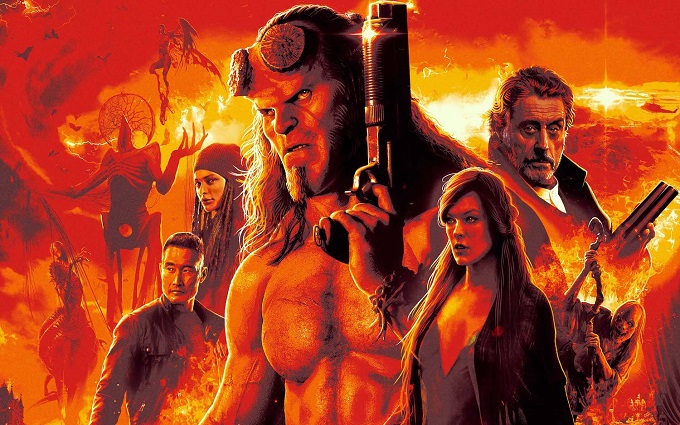
The Plot
Demonic hero Hellboy faces off against a host of wonderfully weird and deadly magical creatures when a centuries old witch called the Blood Queen, returns seeking vengeance by destroying all mankind.
The Good
Hellboy remains an absurdly fun character so the mere existence of this film should at least remind younger comic book fans to check out Mike Mignola’s iconic artwork. Despite having achieved critical fame and modest fan devotion, Guillermo del Toro’s film versions largely failed to succeed at the box office and it had long looked unlikely the character would get another big screen outing. While many may have preferred to see a concluding chapter to Del Toro’s trilogy, at least this film provides new life for the character.
Director Neil Marshall has his own fanbase amongst horror fans and those audiences will likely welcome the more blood drenched and violent version of Hellboy he provides. Particularly those that considered Del Toro’s Hellboy franchise to be a bit too comical and bloodless may welcome a more authentically dark take on the character. While Del Toro had Hellboy drunkenly crooning along to Barry Manilow, by contrast Marshall has him brutally severing Giant limbs with a 15 foot sword.
This film also definitely offers up a host of monstrous fantasy creatures, doing its best to match the impressive effects and world building that made Del Toro’s Hellboy series such an eye watering treat. More devoted fans of the original comics will definitely welcome seeing some of the characters and lore that as left unexplored by Del Toro finally brought to life on screen.
The Bad
Stranger Things star David Harbour has an awkward gravel voiced charisma that should make him a suitable fit for playing Hellboy. Unfortunately a potentially decent performance is largely lost under layers of makeup that sadly fails to capture most of the character’s distinctive visual charms. It’s simply impossible to avoid obvious comparisons with the far superior character design and makeup that perfectly transformed Ron Perlman in Guillermo Del Toro’s past film adaptations. Harbour’s Hellboy is far more sincerely ugly and lacks the pleasant cartoonish simplicity of Mike Mignola’s original artwork. It’s a shame that one of the most crucially important elements of the production feels so badly out of place. In all honesty Harbour looks more like a comic con fan in cosplay than ever coming close to embodying the real character.
Beyond Harbour’s serviceable portrayal of the gruff voiced monster hunter, sadly the rest of the cast offers relatively little. Sasha Lane playing Hellboy’s psychic sidekick Alice gives a performance worthy of a school play. Meanwhile Deadwood star Ian McShane is oddly cast as a suspiciously youthful Professor Broom, Hellboy’s supposedly octogenarian father figure. Milla Jovovich playing the film’s main villainess, the ominously titled Blood Queen, sadly does little to distinguish her performance from any of her other typically stilted displays. While she remains agelessly beautiful, she lacks the necessary menace and gravitas to make her a memorable movie monster. In truth the film never seems to fully unleash her despite obvious potential.
While it’s unfair to constantly compare this version of Hellboy to Del Toro’s past versions, sadly it’s also unavoidably. While the previous Hellboy films were a masterclass in practical effects wizardry, sadly this new version is more heavily reliant on CGI and excessive blood splatter. At times it feels and looks more like an expensively produced video game than an authentically real world. Ultimately it makes it harder not to wonder whether the material would have been better served by a full on animated treatment rather than this live action hybrid. Though there has been several straight to DVD Hellboy animated efforts, it’s a shame that the studio couldn’t have explored the option for a more lavishly realised animated feature that could have finally captured the unique style of Mignola’s striking artwork. Sadly this live action film misses the mark, leaving audiences with generic Resident Evil style CGI action and a regrettably ugly looking Hellboy.
The Ugly Truth
Sadly this ill-favoured reboot doesn’t do nearly enough to step out from the daunting shadow of Mike Mignola’s iconic comic books and Guillermo Del Toro’s past big screen adaptations. Excessive CGI gore can’t hide a generic plot and some weak acting performances in a film that largely squanders excellent source material in ways that feel disappointingly… low budget.
Review by Russell Nelson